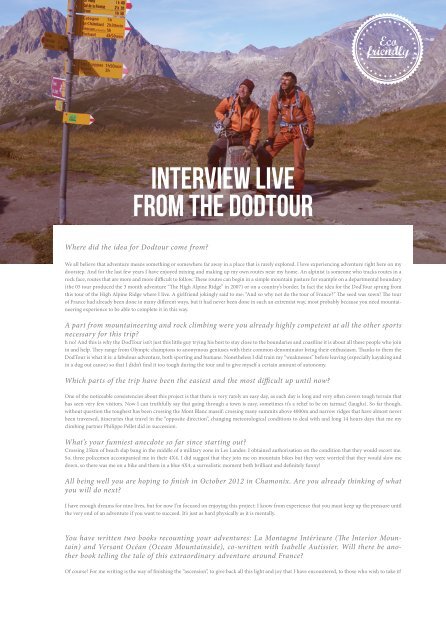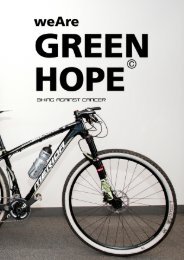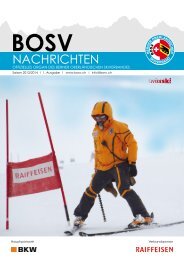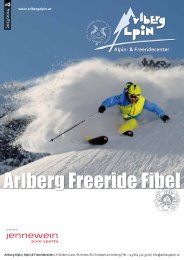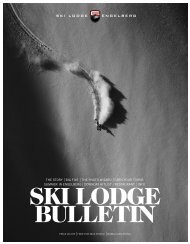Hiking Born to be Wild
« En route, le mieux c'est de se perdre. Lorsqu'on s'égare, les projets font place aux surprises et c'est alors, mais alors seulement, que le voyage commence. » “When travelling, the best thing to do is to get lost, when you’re lost, plans are replaced by surprises and it’s then, and only then, that the journey really begins.” Nicolas Bouvier.
« En route, le mieux c'est de se perdre. Lorsqu'on s'égare, les projets font place aux surprises
et c'est alors, mais alors seulement, que le voyage commence. »
“When travelling, the best thing to do is to get lost, when you’re lost, plans are replaced by surprises
and it’s then, and only then, that the journey really begins.”
Nicolas Bouvier.
Create successful ePaper yourself
Turn your PDF publications into a flip-book with our unique Google optimized e-Paper software.
INTERVIEW LIVE<br />
FROM THE DODTOUR<br />
Where did the idea for Dod<strong>to</strong>ur come from?<br />
Eco<br />
friendly<br />
We all <strong>be</strong>lieve that adventure means something or somewhere far away in a place that is rarely explored. I love experiencing adventure right here on my<br />
doorstep. And for the last few years I have enjoyed mixing and making up my own routes near my home. An alpinist is someone who tracks routes in a<br />
rock face, routes that are more and more dicult <strong>to</strong> follow. ese routes can <strong>be</strong>gin in a simple mountain pasture for example on a departmental boundary<br />
(the 05 <strong>to</strong>ur produced the 3 month adventure “e High Alpine Ridge” in 2007) or on a country’s border. In fact the idea for the DodTour sprung from<br />
this <strong>to</strong>ur of the High Alpine Ridge where I live. A girlfriend jokingly said <strong>to</strong> me: “And so why not do the <strong>to</strong>ur of France?” e seed was sown! e <strong>to</strong>ur<br />
of France had already <strong>be</strong>en done in many dierent ways, but it had never <strong>be</strong>en done in such an extremist way, most probably <strong>be</strong>cause you need mountaineering<br />
experience <strong>to</strong> <strong>be</strong> able <strong>to</strong> complete it in this way.<br />
A part from mountaineering and rock climbing were you already highly competent at all the other sports<br />
necessary for this trip?<br />
h no! And this is why the DodTour isn’t just this little guy trying his <strong>be</strong>st <strong>to</strong> stay close <strong>to</strong> the boundaries and coastline it is about all these people who join<br />
in and help. ey range from Olympic champions <strong>to</strong> anonymous geniuses with their common denomina<strong>to</strong>r <strong>be</strong>ing their enthusiasm. anks <strong>to</strong> them the<br />
DodTour is what it is: a fabulous adventure, both sporting and humane. Nonetheless I did train my “weaknesses” <strong>be</strong>fore leaving (especially kayaking and<br />
in a dug out canoe) so that I didn’t nd it <strong>to</strong>o <strong>to</strong>ugh during the <strong>to</strong>ur and <strong>to</strong> give myself a certain amount of au<strong>to</strong>nomy.<br />
Which parts of the trip have <strong>be</strong>en the easiest and the most dicult up until now?<br />
One of the noticeable consistencies about this project is that there is very rarely an easy day, as each day is long and very oen covers <strong>to</strong>ugh terrain that<br />
has seen very few visi<strong>to</strong>rs. Now I can truthfully say that going through a <strong>to</strong>wn is easy, sometimes it’s a relief <strong>to</strong> <strong>be</strong> on tarmac! (laughs). So far though,<br />
without question the <strong>to</strong>ughest has <strong>be</strong>en crossing the Mont Blanc massif: crossing many summits above 4000m and narrow ridges that have almost never<br />
<strong>be</strong>en traversed, itineraries that travel in the “opposite direction”, changing meteorological conditions <strong>to</strong> deal with and long 14 hours days that me my<br />
climbing partner Philippe Pellet did in succession.<br />
What’s your funniest anecdote so far since starting out?<br />
Crossing 25km of <strong>be</strong>ach slap bang in the middle of a military zone in Les Landes: I obtained authorisation on the condition that they would escort me.<br />
So, three policemen accompanied me in their 4X4. I did suggest that they join me on mountain bikes but they were worried that they would slow me<br />
down, so there was me on a bike and them in a blue 4X4, a surrealistic moment both brilliant and denitely funny!<br />
All <strong>be</strong>ing well you are hoping <strong>to</strong> nish in Oc<strong>to</strong><strong>be</strong>r 2012 in Chamonix. Are you already thinking of what<br />
you will do next?<br />
I have enough dreams for nine lives, but for now I’m focused on enjoying this project: I know from experience that you must keep up the pressure until<br />
the very end of an adventure if you want <strong>to</strong> succeed. It’s just as hard physically as it is mentally.<br />
You have written two books recounting your adventures: La Montagne Intérieure (e Interior Mountain)<br />
and Versant Océan (Ocean Mountainside), co-written with Isa<strong>be</strong>lle Autissier. Will there <strong>be</strong> another<br />
book telling the tale of this extraordinary adventure around France?<br />
Of course! For me writing is the way of nishing the “ascension”, <strong>to</strong> give back all this light and joy that I have encountered, <strong>to</strong> those who wish <strong>to</strong> take it!


